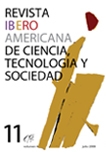Childhood in the Knowledge Society
DOI:
https://doi.org/10.52712/issn.1850-0013-900Keywords:
knowledge society, child, childhood citizenship, childhood in netAbstract
The conceptual context of the Knowledge Society offers new elements on the position that children and teenagers may be able to hold in the foreseeable future. The variables are registered according to the importance that education and a critical spirit get from the Knowledge Societies, the perspectives of a global society that operate through the net and that acquire an awareness of the problems in a universal context, the participation and innovation in public spaces for collective decision-making, the determination of a framework of ethical sufficiency based on the rights and interests of new generations, and the construction of new social scenes that place children as the active main characters in collective actions.
Downloads
References
AMAR AMAR, José Juan, MADARIAGA OROZCO, Camilo (2003): “El contrato Ciencia/Sociedad y la atención integral de la infancia”, Revista Psicología desde el Caribe, Universidad del Norte, Nº 12, pp. 52.75.
AUSUBEL, et al (1990): Psicología educativa, México, Trillas.
BAUMAN, Zygmunt (2006): Vida líquida, Paidós.
BOSCHMA, Jeroen, GROEN, Inez (2006): Generetion Einstein. Edita Grupo Keesie.
BOYDEN, Jo, ENNEEW, Judith (2000): La infancia en el centro de atención: manual para la investigación participativa con niños, Madrid, Ministerio de Trabajo y Asuntos Sociales.
CASTELLS, Manuel (2006): Observatorio global: crónicas de principios de siglo, Barcelona, Libros de Vanguardia.
CASTELLS, Manuel, (2003): “Lección inaugural del programa de doctorado sobre la Sociedad de la Información y el Conocimiento”.
COMITÉ ECONÓMICO Y SOCIAL EUROPEO (2005): “El camino hacia la sociedad europea del conocimiento - La contribución de la sociedad civil organizada a la Estrategia de Lisboa” (2006/C 65/18).
CORNELLA, Alfons, RUCABADO, Sergi (2005): Futuro presente. El futuro es atreverse hoy. 101 Ideas-Fuerzas para entender las próximas décadas, Barcelona, Deusto, p.98.
EURONET (2000): “Haciendo frente a la discriminación contra los niños en la Unión Europea”.
FLORES MONTERO, Corina (2000): La infancia como emblema paradigmático.
INTERMON OXFAN (2005): “Hacia una Ciudadanía Global”.
LIPOVETSKY, Guilles (2007): La felicidad paradójica, Barcelona, Anagrama.
LIPOVETSKY, Guilles (1992): El crepúsculo del deber. La ética indolora de los nuevos tiempos democráticos”, Barcelona, Anagrama.
LIVINGSTONE, Sonia (2007): “Los niños en Europa. Evaluación de los riesgos de Internet”, TELOS, Nº 73, Madrid, Octubre-Diciembre.
MIRANDA DE LARRA, Rocío (2005): “Los menores en la red: comportamiento y navegación segura”, Cuaderno Sociedad de la Información, Nº6, Madrid.
Observatorio de las Telecomunicaciones y de la Sociedad de la Información, REDES (2005): “Infancia y adolescencia en la sociedad de la información. Análisis de la relación con las TIC en el hogar”.
SAVE THE CHILDREN (2002): “Programación de los Derechos del Niño. Cómo Aplicar un Enfoque de Derechos del Niño en la Programación”, Suecia.
SUROWIECKY, James (2004): Cien mejor que uno, Barcelona, Urano Tendencias.
TONUCCI, Francesco (2007) “La ciudad de los niños: el rol profético de la infancia en tiempos de crisis”, XXI Congreso Interamericano de educación católica, Buenos Aires, 5-10 de febrero.
TONUCCI, Francesco (2002): Cuando los niños dicen ¡basta!, Madrid, Fundación Germán Ruipérez.
TWENGE, Jean (2006): Generation Me: Why Today’s Young Americans Are More Confident, Assertive, Entitled—and More Miserable Than Ever Before, Free Press.
UNESCO (2005): Hacia las Sociedades del Conocimiento.
UNICEF (2006): Estado Mundial de la Infancia.
UNICEF (2005): Pobreza infantil en países ricos, Centro de Investigaciones Innocenti.
UNICEF (2005b): “La evolución de las facultades del niño”, Centro Investigaciones Innocenti.
UNICEF (2005c): “Pobreza infantil en perspectiva. Un panorama del bienestar infantil en los países ricos”, Centro Investigaciones Innocenti.
UNICEF (2005d): “Pobreza infantil en países ricos”, Centro Investigaciones Innocenti.
VV.AA (1998): “Planet Chile. A nordic vision for children of the future", Copenhagen.
Downloads
Published
How to Cite
Issue
Section
License
Copyright (c) 2025 CC Attribution 4.0

This work is licensed under a Creative Commons Attribution 4.0 International License.
All CTS's issues and academic articles are under a CC-BY license.
Since 2007, CTS has provided open and free access to all its contents, including the complete archive of its quarterly edition and the different products presented in its electronic platform. This decision is based on the belief that offering free access to published materials helps to build a greater and better exchange of knowledge.
In turn, for the quarterly edition, CTS allows institutional and thematic repositories, as well as personal web pages, to self-archive articles in their post-print or editorial version, immediately after the publication of the final version of each issue and under the condition that a link to the original source will be incorporated into the self-archive.











